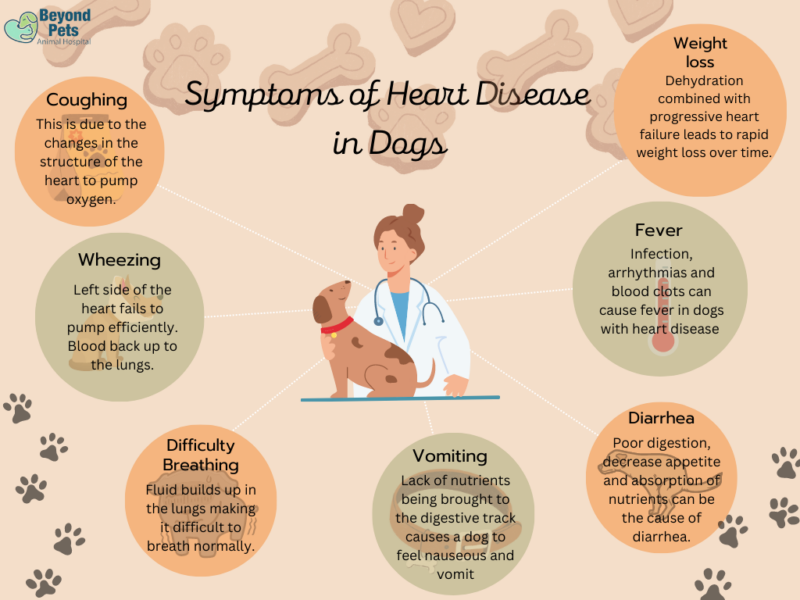What is Heart Disease in Dogs?
What is it?
How is it Treated?
Breed Predispositions
Toy Poodles, Chihuahuas, Yorkshire Terriers, Miniature Schnauzers, German Shepherds, Labrador Retrievers and Rottweilers
Introduction
For the past few weeks, Emma had noticed that her usually energetic Boxer, Rocky, seemed to tire quickly during their daily walks. He would often stop to catch his breath, and occasionally even cough. Concerned about these unusual symptoms, Emma decided to take Rocky to their trusted veterinarian for a check-up. After a thorough examination and some diagnostic tests, the vet shared the concerning news that Rocky was suffering from heart disease, a diagnosis that Emma had never anticipated.
Heart disease in dogs encompasses conditions that impede the structure and performance of the heart and the circulatory system. These cardiac diseases can either be inherent, known as congenital, present from birth, or acquired, evolving. The manifestation of these diseases is characterized by the heart’s reduced capacity to efficiently pump oxygenated blood to tissues and organs within the body.
Like humans, dogs’ heart plays a crucial role, supplying oxygen-rich blood throughout the body and supporting all other organs’ functionality. Consequently, any cardiac disease can critically affect a dog’s health and well-being. This could lead to diminished quality of life and potentially result in grave complications, such as heart enlargement and heart failure.
The specifics of heart disease in dogs can differ considerably based on the type of cardiac disease. It may involve an enlarged heart, abnormalities in the heart function, including the valves or muscles, or irregular heart rhythm. Despite the severity of the condition, many dogs suffering from heart disease can lead rewarding lives given the right management strategies.
Types of Heart Disease in Dogs
There are several types of heart diseases in dogs, and some of these conditions are hereditary, while others are acquired.
Mitral Valve Disease (MVD)
Mitral Valve Disease, a common form of heart disease in dogs, particularly affects older and smaller breeds, such as the Charles Spaniel and the Cocker Spaniel. MVD involves degeneration of the mitral valve that separates the heart’s left atrium and ventricle. As the valve deteriorates, it can cause blood backflow, known as myxomatous mitral valve disease, compelling the heart to work harder to circulate blood.
Dilated Cardiomyopathy (DCM)
Dilated Cardiomyopathy is a form of cardiovascular disease primarily affecting large-breed dogs such as the Doberman Pinscher, Irish Wolfhound, and Golden Retriever. Characterized by weakened heart muscles, DCM leads to the enlargement of the heart chambers and thinning of the heart wall. This deterioration results in a diminished ability for the heart to pump blood efficiently.
Congenital Heart Disease
Congenital heart disease in dogs involves defects present from birth. These can encompass a variety of conditions like ventricular septal defect (hole in the heart), patent ductus arteriosus (abnormal blood flow between two significant arteries connected to the heart), and pulmonic stenosis (narrowing of the pulmonary valve).
Arrhythmias
Arrhythmias, or irregular heart rhythms, can be caused by multiple conditions that disrupt the heart’s electrical conduction system. This disruption can result in abnormally rapid, slow, or irregular heartbeats, which affect the heart’s capacity to pump blood effectively.
Heartworm Disease
Heartworm disease poses a serious and potentially fatal threat due to parasitic worms in the heart and pulmonary arteries. Transmitted through mosquito bites, this disease can lead to severe lung disease, heart failure (also called congestive heart failure), organ damage, and, if left untreated, even death. It’s one of the primary causes of CHF in dogs.
Causes of Congestive Heart Failure in Dogs
Various factors can contribute to dog heart disease, from genetic predispositions to lifestyle influences, underlying conditions, or infections. Here’s an overview of potential triggers for a dog’s heart disease:
- Genetic Factors: Certain dog breeds are predisposed to particular types of heart disease due to their genetics. For instance, breeds such as Boxers and Doberman Pinschers show a higher susceptibility to dilated cardiomyopathy (DCM). In contrast, Cavalier King Charles Spaniels are more prone to mitral valve disease, often leading to a heart murmur. These genetic influences can result in structural or functional abnormalities in a dog’s heart.

- Aging and Wear and Tear: Much like humans, older dogs, particularly senior dogs, can develop heart disease as they age. Over time, alterations in the heart, like the thickening of the heart muscle or the degeneration of heart valves, may occur. These age-related changes can contribute to heart disease, leading to scenarios where the heart cannot pump blood efficiently.
- Infections: Infections like bacterial endocarditis or heartworm disease can damage the heart, triggering heart disease. Bacterial endocarditis is an infection that affects the heart valves. In contrast, heartworm disease is caused by parasitic worms residing in the heart and blood vessels, which can lead to fluid accumulation in the chest.
- Underlying Health Conditions: Certain pre-existing conditions, including thyroid disease, high blood pressure, or kidney disease, can impact the heart and contribute to the onset of heart disease in dogs.
- Endocrine Disorders: Specific endocrine disorders, such as hypothyroidism and Cushing’s disease, also known as vulvar disease, can heighten a dog’s risk of heart disease. These conditions can impact heart function by instigating changes in blood pressure, heart rate, and metabolism.
While these factors don’t guarantee a dog will experience a heart attack or heart disease, they increase the risk. The interaction of genetic components, environmental influences, and a dog’s overall health often determines whether heart disease is possible. Regular check-ups with a vet, especially for small breed dogs and older dogs, are critical for early detection and management of heart disease.
Signs of Heart Condition in Dogs
Clinical signs of heart disease in dogs can differ based on the specific heart condition. Still, pet owners often detect some alterations in behavior, activity levels, weight fluctuations, coughing, respiratory issues, or even unexpected passing. Below are the common signs of heart disease in dogs:

These symptoms can vary based on heart disease type and progression stage. Therefore, any change in your pet’s behavior or health should prompt a consultation with a veterinarian.
Diagnosing Heart Disease in Dogs
Consultation with a veterinary cardiologist is vital for diagnosing heart disease in dogs, thanks to their extensive expertise and familiarity with such conditions. They leverage their skills and a suite of diagnostic instruments to accurately determine the presence of heart disease and create a treatment regimen customized to the dog’s specific health situation.
Initial Physical Examination
The diagnostic process for heart disease starts with a comprehensive physical examination conducted by a veterinarian. It usually involves using a stethoscope to listen to the heart and lungs for unusual sounds, such as heart murmurs or irregular rhythms, often associated with heart conditions.
Blood and Urine Analysis
Such tests provide a holistic view of the dog’s health status and can frequently signal the presence of heart disease. They also highlight abnormalities in various organ systems that could signify heart disease or coexisting health issues.
Chest Radiographs
Chest X-rays help visualize the heart’s size, shape, and principal blood vessels. They can also detect pulmonary edema, a condition characterized by fluid accumulation in the lungs often associated with specific types of heart disease.
Electrocardiogram (EKG or ECG)
An EKG monitors the heart’s electrical activity and can aid in diagnosing certain types of heart disease and irregular heart rhythms or arrhythmias.
Echocardiography
This ultrasound-based examination of the heart can provide in-depth images of the heart’s structure and function. It reveals details about the size, shape, and movement of the heart’s chambers and valves and the strength of the heart’s pumping activity.
Cardiac Catheterization
This invasive procedure is typically reserved for cases where other tests fail to confirm a diagnosis. Nevertheless, it offers extensive details about the heart’s blood flow and pressure levels and allows direct measurement of the heart’s chambers.
The selection and number of tests conducted will be contingent on the specific symptoms your dog presents and the kind of heart disease the veterinarian suspects, including conditions like valvular disease. Using these test results, the veterinarian can be certain if your dog suffers from congestive heart failure and draft an appropriate treatment plan. This is why regular vet visits to screen for heart disease are important for maintaining your pet’s health.
Treatment for a Dog Heart Disease
Heart disease in dogs is a common issue; board-certified veterinary cardiologists are experts at diagnosing and treating it.
The treatment for heart disease in dogs depends on the severity and type of condition present. Some conditions can be managed with medications and lifestyle changes; others may require more intensive medical treatment, such as surgery or pacemaker insertion. Depending on the case, veterinary cardiologists may use a combination of noninvasive treatments, such as medication and diet modifications, to help manage symptoms and prevent the worsening of the condition.
Medications
Different medications can be prescribed depending on the type and severity of the heart disease. Some medications aim to improve heart function, while others aim to manage symptoms. These can include diuretics to reduce fluid buildup, ACE inhibitors to lower blood pressure, and drugs to correct irregular heart rhythms.
Veterinarians may use several types of medications to treat heart disease in dogs, depending on the condition’s specifics. These can include:
- Angiotensin-Converting Enzyme (ACE) Inhibitors – These medications, such as enalapril or benazepril, are often used to treat heart failure in dogs. They work by decreasing the production of angiotensin, a hormone that causes blood vessels to constrict, thereby lowering blood pressure and reducing the workload on the heart.
- Diuretics – Drugs like furosemide help reduce fluid build-up in the body, a common symptom of heart disease known as edema. They work by increasing the amount of salt and water that comes out through the urine, which helps to relieve pressure on the heart.
- Positive Inotropes – Medications such as pimobendan are used to increase the force of the heart’s contractions, helping to improve blood flow in dogs with certain types of heart disease.
- Beta-Blockers – These drugs, such as atenolol or propranolol, reduce the heart rate and the heart’s output of blood, which can benefit dogs with certain types of heart conditions.
- Antiarrhythmics – These medications, such as sotalol or amiodarone, are used to correct irregular heart rhythms.
- Vasodilators – Medications like amlodipine relax and widen blood vessels, making blood flow easier and reducing the amount of work the heart has to do.
Specialized Diets
Diet plays a crucial role in managing heart disease. Dogs diagnosed with heart disease often benefit from a diet low in sodium and enriched with certain nutrients like taurine and L-carnitine, which support heart health. Here are a few key aspects that might be included in a diet for a dog with heart disease:
- Low Sodium
- High in Omega-3 Fatty Acids
- Moderate Protein
- Adjusted Caloric Intake
- Added Taurine and L-Carnitine
- High in Antioxidants
Weight Management
Maintaining a healthy weight is important for dogs with heart disease, as excess weight can strain the heart. Regular, controlled exercise and a balanced diet can help manage your dog’s weight and improve overall health.

Surgery
Surgery may sometimes be necessary to treat the underlying cause of heart disease. For example, dogs with congenital heart defects may benefit from surgical correction, and those with certain types of heart valve disease may require surgery to repair or replace the affected valve.
The type of surgery performed will depend on the nature and severity of the heart condition. Here are a few of the more common heart surgeries performed on dogs:
- Pacemaker Implantation: A pacemaker may be implanted to regulate the heartbeat of dogs with certain types of heart arrhythmias.
- Valve Surgery: In some cases, heart valves may need to be repaired or replaced. This is often the case in dogs with endocarditis or other valve disorders.
- Pericardiectomy: In cases of pericardial effusion, where fluid builds up around the heart, a pericardiectomy may remove part or all of the pericardium (the sac around the heart) to prevent fluid accumulation.
- Patent Ductus Arteriosus (PDA) Closure: PDA is a congenital heart defect where a blood vessel that should have closed shortly after birth remains open, causing abnormal blood flow. This can often be corrected with surgery.
- Subvalvular Aortic Stenosis (SAS) Surgery: SAS is another congenital condition with a narrowing (stenosis) of the aorta, the main artery carrying blood from the heart to the rest of the body. Surgery can be performed to widen this narrowing.
- Congenital Heart Defect Repair: Other congenital heart defects, such as ventricular septal defects (holes in the wall separating the heart’s chambers), can sometimes be surgically repaired.
Remember, any surgical intervention comes with risks, and the decision to proceed with heart surgery should be made after a thorough discussion with a qualified veterinary surgeon or a veterinary cardiologist. They can explain the potential benefits and risks associated with the procedure and provide guidance based on the dog’s overall health and specific condition.
Follow-Up Care
Regular veterinary check-ups and monitoring are vital for dogs with heart disease. Your vet will likely want to monitor your dog’s progress regularly to assess the effectiveness of treatment and make adjustments as necessary.
Each dog is unique, and treatment is typically tailored to the individual dog’s needs.
Preventing Canine Heart Disease
Preventing heart disease in dogs entails regular visits to the vet, adherence to a balanced diet, routine exercise, and maintaining a healthy weight.
- Nutritious Diet: A balanced, nutrient-rich diet is critical for overall wellness and heart functionality. Certain nutrients, such as taurine, are vital to heart health.
- Frequent Exercise: Consistent physical activity aids in controlling a dog’s weight and maintaining cardiovascular fitness. However, it’s crucial to tailor the frequency and intensity of the exercise to the dog’s age, breed, and health status.
- Weight Management: Obesity can pave the way for various health issues, including heart disease. Ensuring your dog’s weight remains within the healthy range through diet and exercise is an essential preventative step.
- Routine Veterinary Examinations: Regular vet check-ups can help identify early heart disease indicators, permitting timely intervention and management.
- Heartworm Prevention: Heartworm disease can lead to severe heart conditions in dogs. Regular administration of heartworm prevention medication is crucial to prevent heart disease, especially in regions where heartworms are prevalent.
- Oral Care: Maintaining good oral hygiene in dogs can prevent mouth bacteria from entering the bloodstream, potentially harming the heart.
- Regulated Sodium Intake: Excessive sodium can lead to hypertension and aggravate heart issues. Consult your vet about the suitable amount of sodium for your dog’s diet.
- Avoid Exposure to Smoke and Environmental Pollutants: Secondhand smoke and specific environmental toxins can induce heart disease in pets and humans.
- Genetic Guidance: Genetic counseling can help you gauge the risks of transmitting congenital heart conditions if you’re contemplating breeding your dog.
- Foster a Peaceful Environment: Long-term stress or anxiety can eventually lead to heart complications. A serene and stable environment can contribute to your dog’s well-being.
Bear in mind that while these measures can diminish the risk, they cannot entirely negate the chances of heart disease, particularly in dogs genetically predisposed to such conditions. Consistent veterinary care is also essential for the early detection and treatment of heart conditions.
Frequently Asked Questions
Disclaimer: The information provided on this veterinary website is intended for general educational purposes only and should not be considered as a substitute for professional veterinary advice, diagnosis, or treatment. Always consult a licensed veterinarian for any concerns or questions regarding the health and well-being of your pet. This website does not claim to cover every possible situation or provide exhaustive knowledge on the subjects presented. The owners and contributors of this website are not responsible for any harm or loss that may result from the use or misuse of the information provided herein.







